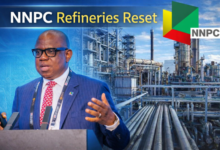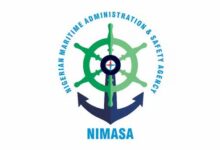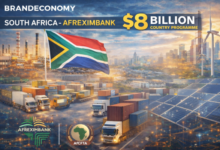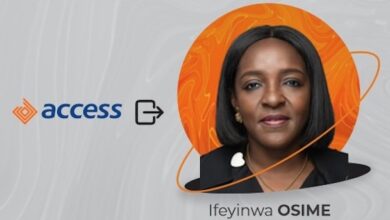Ocean Dragon Launches: Naira-FOB Shipping to Lift Nigeria’s Indigenous Trade
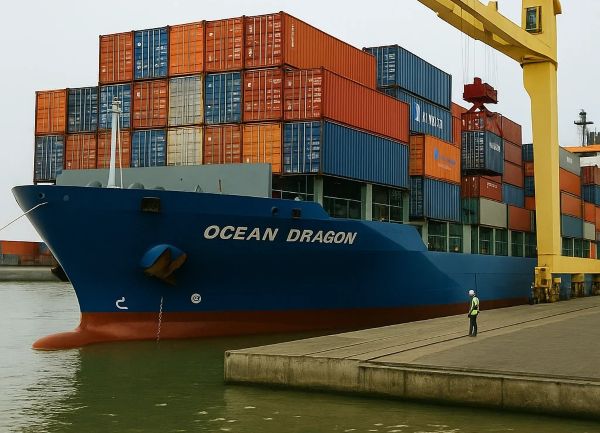
Lagos — Clarion Shipping has unveiled its new vessel, Ocean Dragon, with commercial operations commencing October. The company is pitching a Naira-denominated Free-on-Board (FOB) model, direct sailings (no transshipment), and shipper-friendly terms as a template to rebuild indigenous shipping, reduce FX outflows, and speed up Nigeria-to-world cargo flows.
Who Said What, and Why It Matters
Dr. Boniface Aniebonam (Founder, NAGAFF) called the launch a pivotal step for local carriers, praising NIMASA’s Cabotage enforcement and urging importers/exporters to “back the home team.” He flagged Naira-FOB as a route to save billions in FX, and criticised war-risk surcharges—which Clarion says it won’t pass on to customers.
Chief Chinedu Ukatu (President, Ndigboamaka Progressive Markets Association) described Ocean Dragon as a “game-changer,” arguing that larger parcel sizes and fewer handlings can lower per-tonne emissions and improve trade economics.
Mrs. Ifeoma Eloka (VP, Clarion Shipping) said the line is built to solve African exporters’ pain points: fewer intermediaries, no transshipment, and direct delivery to global destinations. Clarion currently operates with China and maintains a regional base in Abidjan; broader Africa expansion will follow as volumes rise.
Mr. Solomon Ogudo (Ops Manager) added specifics: multiple destination options, faster delivery, inland access at Lagos, Onne, Kano, and Onitsha; plus incentives—21 days free container deposit, flexible demurrage waivers, and dedicated support teams in China and Nigeria.
- Schedule: Ocean Dragon departs China Sept 28; ETA Nigeria Oct 25.
What the Naira-FOB Play Really Changes
1) FX Leakage on Freight
Nigeria traditionally imports on CIF terms with foreign lines; the freight component drains scarce FX. A Naira-FOB option—where local carriage is procured and paid domestically—keeps a larger share of value onshore.
Reality check: bunker fuel, spares, and some insurance are still FX-linked; however, pricing and settlement in Naira for the freight leg reduces immediate FX pressure and improves cash-flow planning for shippers.
2) Time & Risk—Direct Calls vs Transshipment
Every transshipment adds 48–120 hours, extra handling risk, and sometimes unexpected fees. Clarion’s direct-call promise (lane-dependent) cuts dwell time and damage risk, and improves ETA certainty—a big win for retail and manufacturing inventories.
3) War-Risk & Surcharges
The Gulf of Guinea has seen insurance premia that lines often pass through as war-risk surcharges. Clarion’s position—no war-risk line item—is commercially bold. It suggests different risk pooling/coverage or a decision to compete on transparency. Shippers should still check policy coverage is intact and risk properly priced (no surprises at claims stage).
4) Cabotage & Local Content
With NIMASA pressing Cabotage compliance, Ocean Dragon bolsters the supply of Nigerian-controlled tonnage. That strengthens the case for government and corporate cargo owners to allocate liftings to indigenous operators—especially on corridors where service quality and rate parity are proven.
Service Sheet (What Clarion Says You Get)
- Contract Terms: FOB in Naira (where applicable).
- Network: China–Nigeria core, with expansion based on African patronage; Abidjan base for West African coordination.
- Operations: Direct calls, no transshipment (lane-specific); inland port access—Lagos, Onne, Kano, Onitsha.
- Shipper Incentives: 21-day free container deposit, flexible demurrage waivers, dual-shore support desks (China & Nigeria).
- Sustainability Angle: Larger cargo lots + fewer moves = lower emissions per TEU/tonne (operationally plausible).
Why This Could Reset the Market
- Predictable Cashflows: Paying freight in Naira reduces FX volatility exposure, helping CFOs budget and price reliably.
- Inventory Turns: Direct ETAs tighten order-to-shelf cycles, freeing working capital.
- Trade Corridors: With inland nodes (Onitsha, Kano), Clarion links hinterland exporters to deep-sea liftings without fragmented handoffs.
- Competitive Tension: If Clarion’s model sticks, rivals may revisit surcharge policies, dwell-time SLAs, and inland connectivity to defend share.
Risks & What to Watch
- Reliability at Scale: Can Ocean Dragon keep schedule integrity through weather, port congestion, and customs variability? Watch on-time arrival stats this first quarter.
- Coverage Depth: One vessel can seed a network, but shippers with weekly volume need frequency and space guarantees. Look for fleet additions/slots.
- Insurance & Liability: If war-risk isn’t itemised, confirm coverage and claims timelines in the fine print.
- Customs & Inland Transfer: The promise of inland ports hinges on intermodal reliability and paperless release. Track gate-out times and bonded transfer SLAs.
By the Numbers (Launch Window)
- China departure: Sept 28
- Nigeria ETA: Oct 25
- Commercial go-live: October
- Inland nodes: Lagos, Onne, Kano, Onitsha
- Shipper perks: 21-day free container deposit, flexible demurrage waivers, China/Nigeria support desks
BRANDECONOMY Take
Hopefully, Ocean Dragon is more than a christening—it’s a business model test for Nigerian carriers: Naira-FOB pricing, direct calls, and inland reach tied to clear incentives. If Clarion executes on schedule reliability, claims transparency, and hinterland service, it will pull freight back to indigenous lines, cut avoidable FX outflows, and sharpen competition on Nigeria’s busiest lanes.
Bottom line: In shipping, trust = time + transparency. If Clarion keeps both tight, Ocean Dragon won’t just make a splash—it’ll change the tide.


